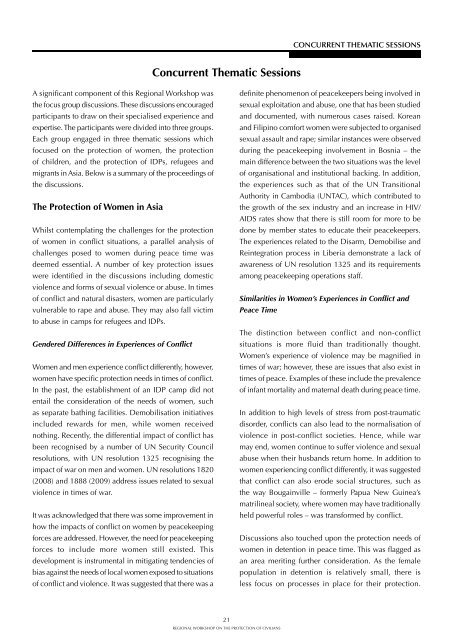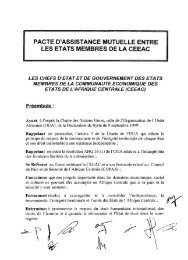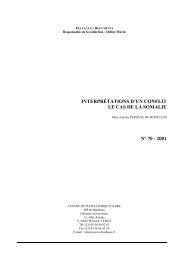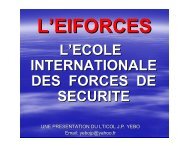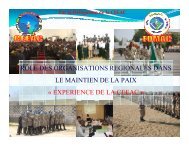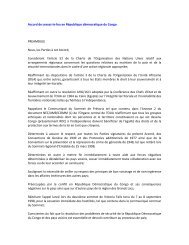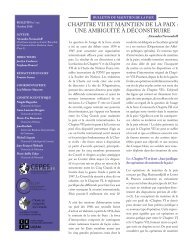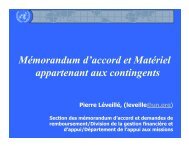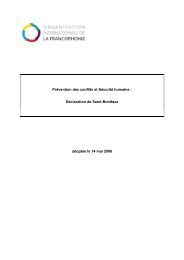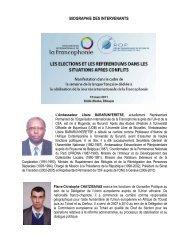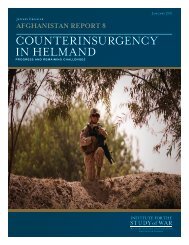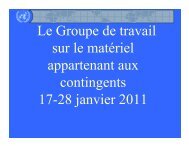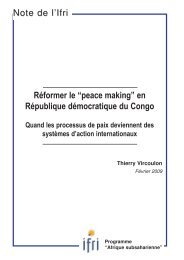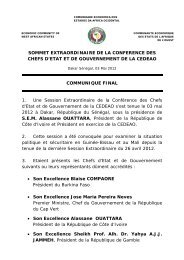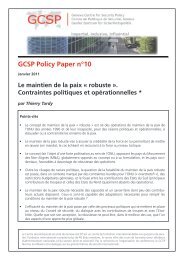Regional Workshop on the Protection of Civilians - S. Rajaratnam ...
Regional Workshop on the Protection of Civilians - S. Rajaratnam ...
Regional Workshop on the Protection of Civilians - S. Rajaratnam ...
Create successful ePaper yourself
Turn your PDF publications into a flip-book with our unique Google optimized e-Paper software.
CONCURRENT THEMATIC SESSIONS<br />
C<strong>on</strong>current Thematic Sessi<strong>on</strong>s<br />
A significant comp<strong>on</strong>ent <strong>of</strong> this <str<strong>on</strong>g>Regi<strong>on</strong>al</str<strong>on</strong>g> <str<strong>on</strong>g>Workshop</str<strong>on</strong>g> was<br />
<strong>the</strong> focus group discussi<strong>on</strong>s. These discussi<strong>on</strong>s encouraged<br />
participants to draw <strong>on</strong> <strong>the</strong>ir specialised experience and<br />
expertise. The participants were divided into three groups.<br />
Each group engaged in three <strong>the</strong>matic sessi<strong>on</strong>s which<br />
focused <strong>on</strong> <strong>the</strong> protecti<strong>on</strong> <strong>of</strong> women, <strong>the</strong> protecti<strong>on</strong><br />
<strong>of</strong> children, and <strong>the</strong> protecti<strong>on</strong> <strong>of</strong> IDPs, refugees and<br />
migrants in Asia. Below is a summary <strong>of</strong> <strong>the</strong> proceedings <strong>of</strong><br />
<strong>the</strong> discussi<strong>on</strong>s.<br />
The Protecti<strong>on</strong> <strong>of</strong> Women in Asia<br />
Whilst c<strong>on</strong>templating <strong>the</strong> challenges for <strong>the</strong> protecti<strong>on</strong><br />
<strong>of</strong> women in c<strong>on</strong>flict situati<strong>on</strong>s, a parallel analysis <strong>of</strong><br />
challenges posed to women during peace time was<br />
deemed essential. A number <strong>of</strong> key protecti<strong>on</strong> issues<br />
were identified in <strong>the</strong> discussi<strong>on</strong>s including domestic<br />
violence and forms <strong>of</strong> sexual violence or abuse. In times<br />
<strong>of</strong> c<strong>on</strong>flict and natural disasters, women are particularly<br />
vulnerable to rape and abuse. They may also fall victim<br />
to abuse in camps for refugees and IDPs.<br />
Gendered Differences in Experiences <strong>of</strong> C<strong>on</strong>flict<br />
Women and men experience c<strong>on</strong>flict differently, however,<br />
women have specific protecti<strong>on</strong> needs in times <strong>of</strong> c<strong>on</strong>flict.<br />
In <strong>the</strong> past, <strong>the</strong> establishment <strong>of</strong> an IDP camp did not<br />
entail <strong>the</strong> c<strong>on</strong>siderati<strong>on</strong> <strong>of</strong> <strong>the</strong> needs <strong>of</strong> women, such<br />
as separate bathing facilities. Demobilisati<strong>on</strong> initiatives<br />
included rewards for men, while women received<br />
nothing. Recently, <strong>the</strong> differential impact <strong>of</strong> c<strong>on</strong>flict has<br />
been recognised by a number <strong>of</strong> UN Security Council<br />
resoluti<strong>on</strong>s, with UN resoluti<strong>on</strong> 1325 recognising <strong>the</strong><br />
impact <strong>of</strong> war <strong>on</strong> men and women. UN resoluti<strong>on</strong>s 1820<br />
(2008) and 1888 (2009) address issues related to sexual<br />
violence in times <strong>of</strong> war.<br />
It was acknowledged that <strong>the</strong>re was some improvement in<br />
how <strong>the</strong> impacts <strong>of</strong> c<strong>on</strong>flict <strong>on</strong> women by peacekeeping<br />
forces are addressed. However, <strong>the</strong> need for peacekeeping<br />
forces to include more women still existed. This<br />
development is instrumental in mitigating tendencies <strong>of</strong><br />
bias against <strong>the</strong> needs <strong>of</strong> local women exposed to situati<strong>on</strong>s<br />
<strong>of</strong> c<strong>on</strong>flict and violence. It was suggested that <strong>the</strong>re was a<br />
definite phenomen<strong>on</strong> <strong>of</strong> peacekeepers being involved in<br />
sexual exploitati<strong>on</strong> and abuse, <strong>on</strong>e that has been studied<br />
and documented, with numerous cases raised. Korean<br />
and Filipino comfort women were subjected to organised<br />
sexual assault and rape; similar instances were observed<br />
during <strong>the</strong> peacekeeping involvement in Bosnia – <strong>the</strong><br />
main difference between <strong>the</strong> two situati<strong>on</strong>s was <strong>the</strong> level<br />
<strong>of</strong> organisati<strong>on</strong>al and instituti<strong>on</strong>al backing. In additi<strong>on</strong>,<br />
<strong>the</strong> experiences such as that <strong>of</strong> <strong>the</strong> UN Transiti<strong>on</strong>al<br />
Authority in Cambodia (UNTAC), which c<strong>on</strong>tributed to<br />
<strong>the</strong> growth <strong>of</strong> <strong>the</strong> sex industry and an increase in HIV/<br />
AIDS rates show that <strong>the</strong>re is still room for more to be<br />
d<strong>on</strong>e by member states to educate <strong>the</strong>ir peacekeepers.<br />
The experiences related to <strong>the</strong> Disarm, Demobilise and<br />
Reintegrati<strong>on</strong> process in Liberia dem<strong>on</strong>strate a lack <strong>of</strong><br />
awareness <strong>of</strong> UN resoluti<strong>on</strong> 1325 and its requirements<br />
am<strong>on</strong>g peacekeeping operati<strong>on</strong>s staff.<br />
Similarities in Women’s Experiences in C<strong>on</strong>flict and<br />
Peace Time<br />
The distincti<strong>on</strong> between c<strong>on</strong>flict and n<strong>on</strong>-c<strong>on</strong>flict<br />
situati<strong>on</strong>s is more fluid than traditi<strong>on</strong>ally thought.<br />
Women’s experience <strong>of</strong> violence may be magnified in<br />
times <strong>of</strong> war; however, <strong>the</strong>se are issues that also exist in<br />
times <strong>of</strong> peace. Examples <strong>of</strong> <strong>the</strong>se include <strong>the</strong> prevalence<br />
<strong>of</strong> infant mortality and maternal death during peace time.<br />
In additi<strong>on</strong> to high levels <strong>of</strong> stress from post-traumatic<br />
disorder, c<strong>on</strong>flicts can also lead to <strong>the</strong> normalisati<strong>on</strong> <strong>of</strong><br />
violence in post-c<strong>on</strong>flict societies. Hence, while war<br />
may end, women c<strong>on</strong>tinue to suffer violence and sexual<br />
abuse when <strong>the</strong>ir husbands return home. In additi<strong>on</strong> to<br />
women experiencing c<strong>on</strong>flict differently, it was suggested<br />
that c<strong>on</strong>flict can also erode social structures, such as<br />
<strong>the</strong> way Bougainville – formerly Papua New Guinea’s<br />
matrilineal society, where women may have traditi<strong>on</strong>ally<br />
held powerful roles – was transformed by c<strong>on</strong>flict.<br />
Discussi<strong>on</strong>s also touched up<strong>on</strong> <strong>the</strong> protecti<strong>on</strong> needs <strong>of</strong><br />
women in detenti<strong>on</strong> in peace time. This was flagged as<br />
an area meriting fur<strong>the</strong>r c<strong>on</strong>siderati<strong>on</strong>. As <strong>the</strong> female<br />
populati<strong>on</strong> in detenti<strong>on</strong> is relatively small, <strong>the</strong>re is<br />
less focus <strong>on</strong> processes in place for <strong>the</strong>ir protecti<strong>on</strong>.<br />
21<br />
REGIONAL WORKSHOP ON THE PROTECTION OF CIVILIANS


